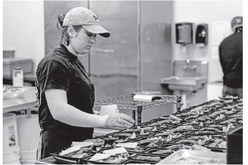CVTC taking innovative approach to remote classes


Hands-on learning still taking place
When leaders of culinary programs throughout the state technical college system held a conference call to ta...


Hands-on learning still taking place
When leaders of culinary programs throughout the state technical college system held a conference call to ta...